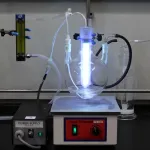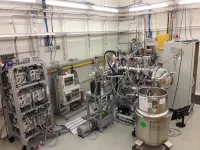(Press-News.org) Rapid-acting antidepressants, including ketamine, scopolamine and psilocybin, have been found to have immediate and lasting positive effects on mood in patients with major depressive disorder but how these effects arise is unknown. New research led by the University of Bristol explored their neuropsychological effects and found that all three of these drugs can modulate affective biases associated with learning and memory.
The paper, published in Science Translational Medicine today [10 January] was carried out in collaboration with researchers at Compass Pathways, Boehringer Ingelheim, and the University of Cambridge.
Negative affective biases are a core feature of major depressive disorder. Affective biases occur when emotions alter how the brain processes information and negative affective biases are thought to contribute to the development and continuation of depressed mood.
The research team used an affective bias test, based on an associative learning task, to investigate the effects of rapid-acting antidepressants (RAADs) in rats. They found that all the treatments were able to reduce negative affective biases associated with past experiences but there were additional characteristics of the dissociative anaesthetic, ketamine, and the serotonergic psychedelic, investigational COMP360 psilocybin (Compass Pathways’ proprietary formulation of synthetic psilocybin), which could explain why the effects of a single treatment can be long-lasting.
The findings suggest that these sustained effects are due to adaptive changes in the brain circuits which control affective biases, and these can influence how past experiences are remembered. The effects at low doses were very specific to affective bias modulation and were localised to the prefrontal cortex of the brain, a region known to play an important role in mood.
Emma Robinson, Professor of Psychopharmacology in the School of Physiology, Pharmacology & Neuroscience at Bristol, and lead author, said: “Using a behavioural task we showed that drugs that are believed to have rapid and sustained benefits in depressed patients, specifically modulate affective biases associated with past experiences, something which we think is really important for understanding why they can improve a patient’s mood so quickly.
“We also found differences in how ketamine, scopolamine and COMP360 psilocybin interact with these neuropsychological mechanisms which may explain why the effects of a single treatment in human patients can be long-lasting, days (ketamine) to months (psilocybin).
“By using an animal model, we have been able to investigate these important interactions with learning and memory processes and neural plasticity and propose a two-stage model that may explain the effects we observe.”
In the task, each animal learnt to associate a specific digging material with a food reward under either treatment or control conditions. The treatment condition is designed to generate a change in the animal’s affective state and a choice test is used to quantify the affective bias this generates.
Acute treatment with the RAADs ketamine, scopolamine, or psilocybin prevented the retrieval of the negative affective bias induced in this model. However, the most exciting finding was at 24 hours after treatment when low, but not high, doses of ketamine and psilocybin led to a re-learning effect where the negatively biased memory was retrieved with a more positive affective valence. Only psilocybin, but not ketamine or scopolamine treatment also positively biased new experiences.
Exploring in more detail the re-learning effects of ketamine in our studies, the researchers found they were protein synthesis-dependent, localised to the medial prefrontal cortex and could be modulated by cue-reactivation, consistent with their predictions of experience-dependent neural plasticity.
The study’s findings propose a neuropsychological mechanism that may explain both the immediate and sustained effects of RAADs, potentially linking their effects on neural plasticity with mood.
END
Neuropsychological effects of rapid-acting antidepressants may explain their clinical benefits, new research finds
2024-01-10
ELSE PRESS RELEASES FROM THIS DATE:
Record heat in 2023 worsened global droughts, floods and wildfires
2024-01-10
Record heat across the world profoundly impacted the global water cycle in 2023, contributing to severe storms, floods, megadroughts and bushfires, new research from The Australian National University (ANU) shows.
The findings are outlined in a new report released today by the Global Water Monitor Consortium and led by ANU researchers.
Lead author Professor Albert Van Dijk, from ANU, said the report underscores the consequences of persistent fossil fuel burning on natural disasters, water resources, biodiversity and food security.
“Record-breaking heat waves swept across the globe in 2023, shattering previous records, from Canada to Brazil and from Spain to Thailand,” ...
MD Anderson research highlights for January 10, 2024
2024-01-10
HOUSTON ― The University of Texas MD Anderson Cancer Center’s Research Highlights showcases the latest breakthroughs in cancer care, research and prevention. These advances are made possible through seamless collaboration between MD Anderson’s world-leading clinicians and scientists, bringing discoveries from the lab to the clinic and back.
Recent developments at MD Anderson include insights into the effects of the gut microbiome on remote tumors, a screening strategy for ovarian cancer early detection, a combination approach ...
Newly identified genes for depression may lead to new treatments
2024-01-10
More than 200 genes linked to depression have been newly identified in a worldwide study led by UCL researchers.
The research, published in Nature Genetics, found more than 50 new genetic loci (a locus is a specific position on a chromosome) and 205 novel genes that are associated with depression, in the first large-scale global study of the genetics of major depression in participants of diverse ancestry groups.
The study also showcases potential for drug repurposing, as one of the identified genes encodes a protein targeted by a common diabetes drug, while also pointing to new targets for drugs that ...
In hot water: coral resilience in the face of climate change
2024-01-10
From intensifying wildfires to record-breaking floods year on year, the effects of climate change have manifested in devastating outcomes on ecosystems that threaten species all over the world. One such ecosystem in peril is coral reefs, which play a major role in sustaining biodiversity in the planet’s oceans but are facing increasingly severe conditions as waters heat up leading to a phenomenon known as marine heat waves.
For nearly a decade, Katie Barott, assistant professor of biology at the University ...
JMIR Aging accepted for inclusion in MEDLINE
2024-01-10
JMIR Publications is pleased to announce that JMIR Aging has been accepted for inclusion in MEDLINE, which is the U.S. National Library of Medicine's premier bibliographic database.
JMIR Aging had already been indexed in PubMed previously. MEDLINE is a more selective subset of PubMed, consisting of the top 5,200 biomedical journals. Indexing in MEDLINE also means that articles are now also indexed with NLM Medical Subject Headings (MeSH terms) and other metadata.
Selection for MEDLINE is a result of a thorough review of the journal by reviewers from the Literature ...
Dry-cleaning fluid becomes a synthetic chemist's treasure
2024-01-10
The widely used dry-cleaning and degreasing solvent perc can be converted to useful chemicals by a new clean, safe and inexpensive procedure. The Kobe University discovery using on-demand UV activation may open the path to upcycling perc and thus contribute to a more sustainable society.
Organic synthesis is the production of useful chemicals, such as drugs, from other available chemicals. In general, chemists use source materials to create simple building blocks, such as carbonate esters, and combine them to increasingly complex structures. The source materials for this need to be reactive, but that also usually makes them toxic, such as the commonly ...
Countries and companies need to address declining global fertility rates, doctors say
2024-01-10
The global fertility rate is declining and most governments are failing to recognize and address the impact on economies and societies, say a group of physicians invited by the International Federation of Fertility Societies (IFFS) in a new paper and campaign launched today.
“Not including the effects of migration, many countries are predicted to have a population decline of more than 50% from 2017 to 2100,” the physicians write in “Declining global fertility rates and the implications for family planning and family building,” published January 10, 2024 in Human Reproduction Update.
“By 2050, 77% of predominantly high-income countries, and ...
The reaction mechanism for catalytic ammonia production experimentally determined
2024-01-10
Researchers at Stockholm University have for the first time been able to study the surface of iron and ruthenium catalysts when ammonia is formed from nitrogen and hydrogen; the results are published in the scientific journal Nature. A better knowledge of the catalytic process and the possibility of finding even more efficient materials opens the door for a green transition in the currently very CO2-intensive chemical industry.
Ammonia, produced in the Haber-Bosch process, is currently one of the most essential base chemicals for the world to produce fertilizers, with an annual production of 110 million tones. The journal ...
Ancient DNA reveals reason for high multiple sclerosis and Alzheimer’s rates in Europe
2024-01-10
Researchers have created the world’s largest ancient human gene bank by analysing the bones and teeth of almost 5,000 humans who lived across western Europe and Asia up to 34,000 years ago.
By sequencing ancient human DNA and comparing it to modern-day samples, the international team of experts mapped the historical spread of genes – and diseases – over time as populations migrated.
The ‘astounding’ results have been revealed in four trailblazing research papers published today (10 January 2024) in the same issue of Nature and provide new ...
Noninvasive test for embryo quality could streamline fertility treatment
2024-01-10
In-vitro-fertilization (IVF), a fertility treatment that involves fertilizing eggs in the laboratory and later implanting them in the uterus, has been a source of hope for many people struggling to conceive. However, the multi-step process is complex, and the overall live birth rate after IVF treatment is only 20-40% in females younger than 40 in the United States. One of the reasons for this low success rate is that it’s very difficult for doctors to determine which lab-grown embryos are most likely to result in a successful pregnancy, so many people seeking IVF must go through multiple rounds of treatment.
Now, scientists at University of California San Diego School of ...





